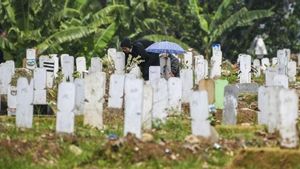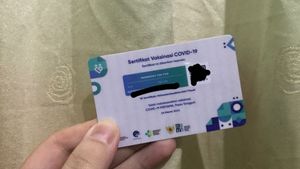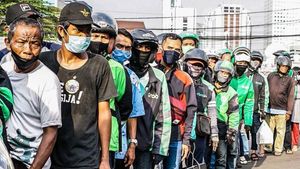JAKARTA - The National Civil Service Agency (BKN) objected to the final report on the results of the Indonesian Ombudsman's examination regarding the implementation of the National Insight Test Assessment (TWK) for employees of the Corruption Eradication Commission (KPK). BKN then sent a letter addressed to the Chairman of the Ombudsman RI.
The attitude taken by BKN is the same as the KPK, which some time ago objected and refused to take corrective action from the Indonesian Ombudsman. In the report, the KPK and BKN were both declared maladministration and abuse of authority during the test as a condition for the transfer of status to an anti-corruption commission employee.
"BKN has responded and today, as of today, a letter has been sent to ORI, signed by the Head of the State Civil Service Agency, addressed to the Chief Ombudsman of the Republic of Indonesia," said Deputy Head of BKN Supranawa Yusuf in an online press conference, Friday, August 13.
He said that this objection was raised because BKN felt that the findings of the Indonesian Ombudsman were not correct. At least there are several points that he has highlighted, the first is the Ombudsman's conclusion which states that BKN is incompetent in organizing the TWK of KPK employees.
Defending BKN
According to him, BKN has the authority to carry out TWK assessments referring to a number of laws and regulations such as Law (UU) Number 5 of 2014 concerning ASN; Law Number 30 of 2014 concerning Government Administration; and BKN Regulation Number 26 of 2019 concerning Guidance on the Implementation of the Competence Assessment of Civil Servants.
In addition, Supranawa also said that the involvement of assessors from other agencies as mentioned by the Ombudsman in his findings was also legitimate. Provided, this is carried out in accordance with the rules in BKN.
"We, BKN object to ORI's conclusion. We state that this conclusion is an inappropriate conclusion," he said.

Supranawa also refuted the conclusion of the Indonesian Ombudsman which stated that BKN ignored President Joko Widodo's (Jokowi) directive regarding the TWK's final decision. According to him, the directive, which asked for the results of the TWK not to be used as a basis for stopping non-qualified employees, had been carried out by holding a coordination meeting on May 25.
At that time, besides being attended by the Head of BKN Bima Haria Wibisono, the meeting was also attended by related parties such as the Chair of the KPK Firli Bahuri, Menkumham Yasonna Laoly, MenpanRB Tjahjo Kumolo, Chairman of LAN Adi Suryanto, and Chairman of the ASN Commission Agus Pramusinto.
From the meeting, it was finally decided that the employees who passed would be handed an Employee Identification Number (NIP) which was then continued with status transfer, inauguration, and orientation held by LAN. Meanwhile, employees who fail will be given National Insight and State Defense education.
"The rest of the 51 people will be followed up by the KPK leadership in accordance with applicable laws," said Supranawa.
Furthermore, he also stated that BKN had actually carried out corrective actions by the Indonesian Ombudsman, one of which was to draw up a roadmap related to the transfer of employment status to ASN. This program, said Supranawa, was even included in the BKN strategic plan for 2020-2024.
"So if we are honest, whether or not there is corrective action for ORI, BKN actually already has the program," he said.
Objection from KPK

Previously, the KPK expressed objections and would not carry out any corrective actions submitted by the Indonesian Ombudsman after maladministration and abuse of authority were found in the TWK implementation process. There are 13 points of objection from the KPK which resulted in the refusal to carry out corrective actions according to the report of the Indonesian Ombudsman.
Among these points, the KPK considers the Ombudsman to have violated its legal obligation to refuse reports or stop the examination of reports that are known to be under court examination.
The anti-corruption commission also considers the legal standing of the reporter, that is, employees who are declared not to have passed the TWK are not the people who receive KPK services as parties who have the right to report to the Ombudsman.
Not only that, the KPK said that the corrective actions from the results of the Indonesian Ombudsman's report had no causal relationship and conflicted between the conclusions and the final report.
*Read other information about KPK or read other interesting articles from Wardhany Tsa Tsia.
Other SOLID NEWS
SEE ALSO:
The English, Chinese, Japanese, Arabic, and French versions are automatically generated by the AI. So there may still be inaccuracies in translating, please always see Indonesian as our main language. (system supported by DigitalSiber.id)


















